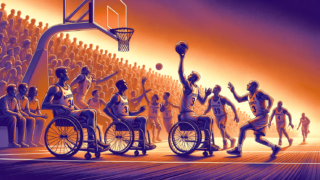
Legacy of Basketball Legends Who Passed Away Too Soon
Written by: Basketball Universe
Last updated:

Throughout the storied history of basketball, the world has witnessed the birth and evolution of exceptional talents, remarkable achievements, and passionate rivalries. Time and time again, our hearts have swelled with pride as we watched some of the most iconic and gifted athletes grace the court, etching their names in the annals of basketball immortality. But not all heroes endure, and some are fated to have their bright stars extinguished too soon. In this blog post, we delve into the awe-inspiring and, at times, heartbreaking legacies of basketball legends who left us prematurely, leaving an indelible mark that will forever shape the way we remember the game.
Legacy of Basketball Legends Who Passed Away Too Soon
The legacy of basketball legends who passed away too soon is one that highlights the immense impact they had on the sport, their teams, and the fans, despite their tragically short careers. These extraordinary athletes displayed remarkable talent, dedication, and a profound love for the game that left memorable marks on the world of basketball. Their contributions transcended their performances on the court, as they inspired the next generations, and their stories serve as powerful reminders of both the greatness that can be achieved and the vulnerability of life.
Dražen Petrović: The European Pioneer
One of the first European superstars to make a significant impact on the NBA, Dražen Petrović, affectionately known as ‘Petro,’ was a legendary shooting guard who took the league by storm in the late 1980s and early 1990s. Born in Croatia, Petro began his professional career in Europe, where he showcased his incredible scoring ability and earned the nickname “Mozart of Basketball” while playing for local teams in his home country and later moving to Spain’s top-tier league.
Dražen was drafted by the Portland Trail Blazers in 1986 but didn’t join the NBA until the 1989-1990 season due to contractual obligations in Europe. Eventually, Petrović was traded to the New Jersey Nets in 1991, where he truly found his stride. In just two seasons with the Nets, Petrović would average over 20 points per game, shooting an impressive 43.7% from three-point range. His sharp shooting, precise passing, and intense competitiveness made him a fan favorite and a nightmare for opponents.
Unfortunately, Petro’s career and life were tragically cut short in a car accident on June 7, 1993, at just 28 years old. His untimely death left basketball fans across the world mourning the loss of one of the game’s brightest talents. In his honor, NBA TV produced the documentary “Once Brothers,” which details the story of Petrović’s friendship with Serbian basketball legend Vlade Divac and the impact of Yugoslav basketball history on both of their lives. He was posthumously inducted into the Naismith Basketball Hall of Fame in 2002, forever securing his place in basketball history.
Dražen’s Lasting Legacy
Dražen Petrović’s legacy is not only his incredible skill and impressive NBA statistics but also his pivotal role in breaking down barriers for European athletes to enter the league. Petro’s success in the NBA paved the way for countless international players to follow in his footsteps, turning the NBA into a truly global game. Each time an international player succeeds in the league, a part of Petro’s legacy lives on.
Len Bias: A Dream Unfulfilled
When discussing basketball legends who passed away too soon, it is impossible not to mention Len Bias. Born in 1963, Bias would have had a lasting impact on basketball history had his life not ended abruptly. A supremely gifted forward from the University of Maryland, Bias was a genuine phenom who possessed the complete package of what a future NBA star would need – size, power, athleticism, basketball IQ, and a fierce competitive spirit.
After a dominant college career where he averaged 16.4 points and 5.7 rebounds per game, Bias was drafted by the Boston Celtics as the second overall pick in the 1986 NBA Draft. Celtics’ fans and players were excited about the impact Bias was expected to bring to the team, potentially creating a dynasty alongside all-time greats, Larry Bird and Kevin McHale. Tragically, just two days after the draft, Bias died of a drug overdose at the age of 22, leaving a sense of devastation and an enormous void in what could have been a remarkable NBA career.
Len Bias’ Tragic Tale as a Cautionary Lesson
While Len Bias never played a minute of NBA basketball, the story of his potential and tragic death remains an essential cautionary tale. His legacy serves as a reminder to athletes and basketball fans that despite their seemingly invincible exterior, NBA players are human beings with their personal struggles and vulnerabilities. Bias’ story is an essential reminder about the significance of executive behavior and decision-making, both on and off the court.
Hank Gathers: A Heartbreaking Story of Perseverance
Hank Gathers might not be a household name to younger generations, but his tale of determination in the face of adversity remains one of the most poignant stories in basketball history. Born in Pennsylvania in 1967, Gathers was a college basketball standout at Loyola Marymount University. During his junior season, Gathers became the first player in Division I history to lead the nation in both scoring and rebounding, an incredibly impressive feat by any standard.
Gathers’ dominance carried through his senior year, and it appeared he was on track to become a high lottery pick in the upcoming NBA draft. However, tragedy struck during the semi-final of the West Coast Conference tournament in March 1990. Just moments after throwing down a thunderous dunk, Gathers collapsed on the court due to a previously diagnosed heart condition. Despite initially gaining consciousness, he passed away shortly after at the age of 23. The untimely loss of Gathers, a player with such immense promise, was nothing short of heartbreaking.
Hank Gathers’ Impact on the Game
Although Hank Gathers’ life and career were cut far too short, his legacy remains an inspiration for fans and players alike. Gathers’ determination on the court, the high energy with which he competed, and his tenacious rebounding are forever etched in college basketball lore. His story also led to a greater emphasis on heart health for athletes and increased precautions to protect players from potential on-court health incidents, potentially saving lives along the way.
Reggie Lewis: A Star That Faded Quickly
Born in Baltimore in 1965, Reggie Lewis was a highly respected and electrifying scorer who seemed destined for future greatness during his playing days. After a modest college career at Northeastern University, the Boston Celtics selected him as the 22nd overall pick in the 1987 NBA Draft. In Boston, Lewis displayed an uncanny ability to score while showcasing his exceptional athleticism, and he quickly emerged as one of the most gifted wing players of his era.
While it took a short time for Lewis to find his groove, his patience and determination proved fruitful. By his third season, he had become the Celtics’ leading scoring option in the aftermath of the Larry Bird era. In 1992, he earned his first and only All-Star selection, validating his place among the league’s elite. Tragically, however, during the 1993 NBA playoffs, Lewis collapsed on the court. He was later diagnosed with a life-threatening heart condition and subsequently passed away at just 27 years old during an offseason practice in July 1993.
Preserving Reggie Lewis’ Memory
Despite his tragically short career, Reggie Lewis’ breathtaking skills, intense gameplay, and commitment to his craft live on in the memories of fans who were fortunate enough to witness his talents firsthand. The tragic loss of such a promising young player highlights the importance of medical care and attentiveness to the health of professional athletes. Lewis’ number 35 jersey now hangs from the rafters of TD Garden, a lasting tribute to his powerful contributions to the Celtics franchise and the game of basketball.
Building a Better Future for Athletes
The legacies of these basketball legends who passed away too soon serve as a constant reminder to teams, coaches, and players to prioritize player health and well-being, both mentally and physically. Today, more attention is placed on the importance of proper medical assessments, treatment, and the comprehensive mental health of our beloved athletes. The stories of these remarkable talents are not only inspiring but also serve as a sobering reminder that regardless of one’s superstar status, life remains fragile and precious. These legends will forever be admired and will continue to shape the course of basketball history.
Ben Wilson: The Phenom Chicago Never Forgot
Among the other basketball legends who passed away too soon is Ben “Benji” Wilson, a 17-year-old high school basketball prodigy in Chicago. Born in 1967, Wilson’s story is unique because he never made it to the college or professional levels, yet his impact on the city of Chicago and the basketball world remains profound.
As a junior at Simeon Career Academy, Wilson helped his team win the 1984 Illinois State Championship and was ranked the nation’s top high school player before his senior year. His combination of size, agility, and skill was unparalleled among his peers, making him an incredible prospect with limitless potential. However, on November 20, 1984, Wilson was tragically shot and killed in a random act of violence, shaking the very core of the Chicago basketball community.
Ben Wilson’s Legacy Lives On
While Ben Wilson never got the chance to play college or professional basketball, his influence can still be felt today. A documentary titled “Benji” was released in 2012, detailing his life and the impact of his death on the Chicago basketball scene. Wilson’s story is regularly taught to young Chicago athletes as a reminder of the importance of seizing every opportunity in life while also calling attention to the need for reducing gun violence in our communities. His number 25 jersey is retired at Simeon Career Academy as a symbol of the greatness that was tragically taken away too soon.
Michael Wright: A Basketball Ambassador Lost
Michael Wright, born in 1980, had a storied career in both college and professional levels of basketball, but his life was tragically cut short. Wright was a dominant power forward for the University of Arizona, earning a spot on the All-Pac-10 First Team and a reputation for his impressive offensive skills, strong work ethic, and diligent rebounding. After college, he was selected by the New York Knicks in the second round of the 2001 NBA Draft.
Although Wright never achieved significant attention in the NBA, he found success playing internationally throughout Europe and Asia, often serving as an unofficial ambassador for the sport. Tragically, on November 10, 2015, Wright was found dead in his vehicle near his Brooklyn home at the age of 35, the victim of a violent crime.
Remembering Michael Wright
In the wake of his death, Michael Wright was celebrated for his contributions and positive impact on international basketball. He remains an example of how one can utilize their talents to inspire others and excel at the highest level in a global sports landscape. His story is also a stark reminder of how close the loss of a young, promising athlete can be to home, even for those who achieve physical, emotional, and financial success.
Miles Simon: A Life Dedicated to Basketball
Miles Simon, not to be confused with the Miles Simon who is currently an assistant coach for the Los Angeles Lakers, was an American basketball player known for his hard work and dedication to the game. Born in 1974, Simon played college basketball for the University of California, Berkeley. He went on to play internationally and professionally in the United States Basketball League (USBL).
In 2000, Simon suffered a heart attack at the age of 25 during a game in Brooklyn, New York. Despite being rushed to the hospital, he passed away, leaving his family, friends, and fans heartbroken.
Miles Simon’s Impact on Basketball
Simon’s dedication to the sport of basketball was unwavering, and he consistently played with passion, determination, and a love for the game. His life serves as a reminder that basketball is more than a sport; it is an opportunity for individuals to develop lasting relationships and to learn life lessons from the game. Today, Simon’s impact is remembered fondly by his teammates and friends in the basketball community, who continue to hold him in high regard as a reflection of hard work and commitment to the game he loved.
Frequently Asked Questions
If you’re looking for additional information related to the legacy of basketball legends who passed away too soon, we’ve compiled a list of frequently asked questions to help guide you. These questions and answers will provide interesting insights and further context about the lives and careers of these deeply missed athletes.
1. How did Dražen Petrović die?
Dražen Petrović passed away in a tragic car accident on June 7, 1993, at just 28 years old. He was traveling in a car on a rain-slicked highway in Germany when the fatal accident occurred.
2. Why is Len Bias’ death considered a turning point in NBA history?
Len Bias’ shocking death marked a significant turning point, serving as a wake-up call concerning drug abuse in professional sports. Following his death, the NBA implemented stricter anti-drug policies to protect the players and maintain the integrity of the game.
3. How did Hank Gathers die?
Hank Gathers died of a heart condition known as cardiomyopathy during a college basketball game on March 4, 1990. Gathers collapsed on the court just moments after a spectacular dunk and passed away shortly after.
4. What was the cause of Reggie Lewis’ death?
Reggie Lewis passed away at the age of 27 due to a heart condition called hypertrophic cardiomyopathy during an offseason practice on July 27, 1993.
5. How has the NBA improved medical assessments since Reggie Lewis’ death?
Since Reggie Lewis’ death, the NBA has placed a greater emphasis on player health and has introduced more stringent medical assessments, particularly related to the early detection and management of heart conditions. These measures help minimize the risks associated with underlying health issues in players.
6. How old was Ben Wilson when he died?
Ben Wilson was just 17 years old when he was tragically shot and killed on November 20, 1984, in a random act of violence in Chicago.
7. What happened to Michael Wright?
Michael Wright was found dead in his vehicle near his Brooklyn home at the age of 35 on November 10, 2015. His death was the result of a violent crime.
8. What are some ways these tragic deaths have changed the sport of basketball?
The tragic deaths of these basketball legends have had lasting impacts on the sport, including increased awareness about player health, mental well-being, lifestyle choices, and drug abuse awareness. Additionally, their stories serve as powerful reminders of the fragility of life and the importance of seizing every opportunity.
9. Why is Hank Gathers considered a symbol of determination?
Hank Gathers is considered a symbol of determination due to his relentless work ethic, intense competitive spirit, and his impressive accomplishment of leading the nation in both scoring and rebounding during his junior season at Loyola Marymount University.
10. How have these stories inspired future generations of basketball players?
These tragic stories have inspired future generations of basketball players to understand the importance of health, integrity, and dedication, both on and off the court. The stories of these legends serve as a constant reminder to cherish life, strive for greatness, and always aim for personal growth and improvement.
Featured Posts
- No pillar pages found.




